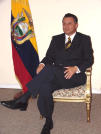 |
| Home |
| |
Analyses |
| |
Aid |
| |
| |
| |
News |
| |
| |
| |
| |
|
Last Updated:3/12/02 |
|
U.S.
Military and Police Aid
- Focus on Arauca and Putumayo:Timeline
of Current Events Putumayo: October 29, 2003 In
testimony before the U.S. Senate Committee on Foreign Relations,
Robert B. Charles, October
23, 2003
Colombia defended the use of glyphosate in the border region before the Scientific Commissions' meeting, arguing that glyphosate is a low-toxicity product that does not affect human health. The
Ecuadorian commission avoided making any public statements about
the Colombian conclusions; additionally the joint commission agreed
to visit the border region in the near future. [El
Tiempo (Colombia) http://eltiempo.terra.com.co/poli/2003-10-15/ARTICULO-WEB-_NOTA_INTERIOR-1285708.html] The
Colombian Ministry of Foreign Relations confirmed a meeting between
the Scientific Commissions, which analyzed the effects of fumigations
on the common border. A spokesperson for the Ministry also clarified
that "Putumayo is not being fumigated, not because of Ecuadorian
pressures but because the cycle has been completed." A press release from the Colombian Ministry of Foreign Relations stated that the Scientific Commissions of Ecuador and Colombia were scheduled to meet in Bogotá on October 14. This commission was created to exchange information about the fumigation of illegal crops and to assess the impact, consequences and alternatives. The release added that fumigations currently are not being carried out in Putumayo. [Colombian Ministry of Foreign Relations http://portal.minrelext.gov.co/portal/webdriver.exe?MIval=mr_comunicaciones.html]
|
|
|
| Asia |
| |
Colombia |
| |
| |
Financial Flows |
| |
National Security |
| |
|
Center for
International Policy |
